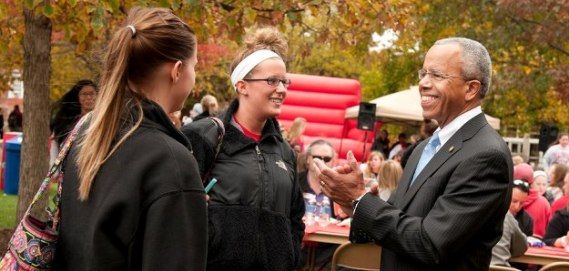Illinois State President Al Bowman’s retirement announcement Monday was met with an outpouring of praise and sadness from students, alumni and community leaders, with many attributing his inclusive leadership style as key to helping the University stay competitive and navigate tough financial times.
Bowman, 59, took over as Illinois State’s 17th president in 2004 after serving as interim president and provost. Prior to serving as a top administrator, Bowman was a faculty member and chair of what’s now the Department of Communication Sciences and Disorders. Bowman’s nine-year tenure is one of the longest for an Illinois State president.
Early reflections on Bowman’s legacy, gathered by the STATEside staff, show wide respect for his commitment to shared governance, a model that brought key stakeholders such as the Academic Senate and Student Government Association deeper into the University policy-making process.
That’s been apparent, for example, during the recent revision process for the University’s strategic plan, called Educating Illinois, said Illinois State Alumni Association President Greg Ayers ’90. Bowman has placed a high priority on reaching out to diverse constituencies, including alumni, to help craft that revised plan, called Educating Illinois 2013-18: Individualized Attention, Shared Aspirations, Ayers said.
“That doesn’t happen everywhere,” Ayers said. “We have great appreciation for that.”
Bowman has made student opinion a vital part of the University’s decision-making process, said Student Government Association President Andrew Manno. The president’s leadership ability has put the University in a much stronger financial position than its peers, while continuing to attract high-achieving students, Manno said.
“After I step back emotionally, I look at it as being grateful that we had a chance to have someone like him in a leadership role,” Manno said. “He’s done so many great things for this university, and positioned us in a way that no other university is in right now.”
Students also appreciated seeing Bowman shake hands or take photos with them at some of the countless campus events he attended, Manno said. That ability to connect with students was apparent Monday on social media, with one freshman asking on Twitter after hearing the retirement news: “Is it weird that I cried?”
“That showed me he was really interested in student success,” Ayers said.
Academic Senate Chairman Daniel Holland credited Bowman with always being forthcoming with information and said Bowman’s greatest achievement has been moving Illinois State into the top tier of the state’s public universities during a period of annual state budget cuts.
“He knows the University inside and out and served it well,” Holland said.
Bowman’s willingness to engage was clear early on, when he reached out to alumni and former student leaders about campus issues a decade ago while he explored becoming ISU’s president, said Brian Bernardoni ’91. The former student body vice president said he couldn’t have been more impressed by that first meeting with Bowman, who joined ISU in 1978 as a faculty member in the Department of Speech Pathology and Audiology.
“He understood campus was not just teachers and students, that there was a community around it,” Bernardoni said.
Bowman has lead efforts to modernize the inside of several campus buildings and rebuild Hancock Stadium, and he’s been forward-thinking with his approach to residence halls, including construction of the new Cardinal Court, said Bernardoni, now senior director of government and public policy for the Chicago Association of Realtors.
Most importantly, Bowman’s Illinois State has placed a high priority on competing against other universities for the best students, Bernardoni said. Indeed, the average ACT score for an incoming student is near 24, and Illinois State’s graduation rate of 71 percent puts it ahead of every public college campus in Illinois except one. And the growing reputation of the College of Business and other nationally known academic programs on Bowman’s watch has not gone unnoticed in Chicago and beyond, Bernardoni added.
“There’s a different swagger that’s attached to my degree now,” Bernardoni said. “To be that kind of executive, in these kinds of times, that’s a special thing.”
Before Bowman publicly announced his retirement Monday, he called local political leaders to explain his decision. This is something he has regularly done prior to announcing major decisions, State Rep. Dan Brady said Monday.
“It’s always been a style I have appreciated from Al Bowman,” Brady said.

Illinois State President Al Bowman, center, with Normal Mayor Chris Koos, left, and Bloomington Mayor Steve Stockton at 2010 Homecoming tailgating.
Bowman’s collaborative spirit was what helped him succeed during challenging times for higher education, according to Brady, who as a member of the General Assembly’s Higher Education Appropriations Committee worked closely with Bowman.
“He has always been an outstanding leader for the University,” Brady said. “He was just a great fit at the time for all the changes. He was a no-nonsense guy… a good family man—all the things that exemplify Illinois State University.”
Bowman never forgot his roots as a member of the University’s speech pathology faculty, Brady said.
“He knew the entire family of that university,” Brady said.
Normal Mayor Chris Koos said Bowman was very good at identifying what was really strong about the University, boosting its status in the minds of federal and state leaders and to the top of the heap of the state’s public universities.
“He was an advocate-cheerleader for the University,” Koos said. He appreciated the good relationship he had with Bowman. When he spoke with other mayors of college towns, he discovered this was unusual.
“I found our relationship really stood out,” Koos said.
He and Brady were surprised by Bowman’s decision but understood his reasons. Koos cited the 24–7 demands required of the president.
“He will be remembered as a standout president at Illinois State University,” Koos said.
Kevin Bersett can be reached at kdberse@ilstu.edu. Ryan Denham can be reached at rmdenha@ilstu.edu.

